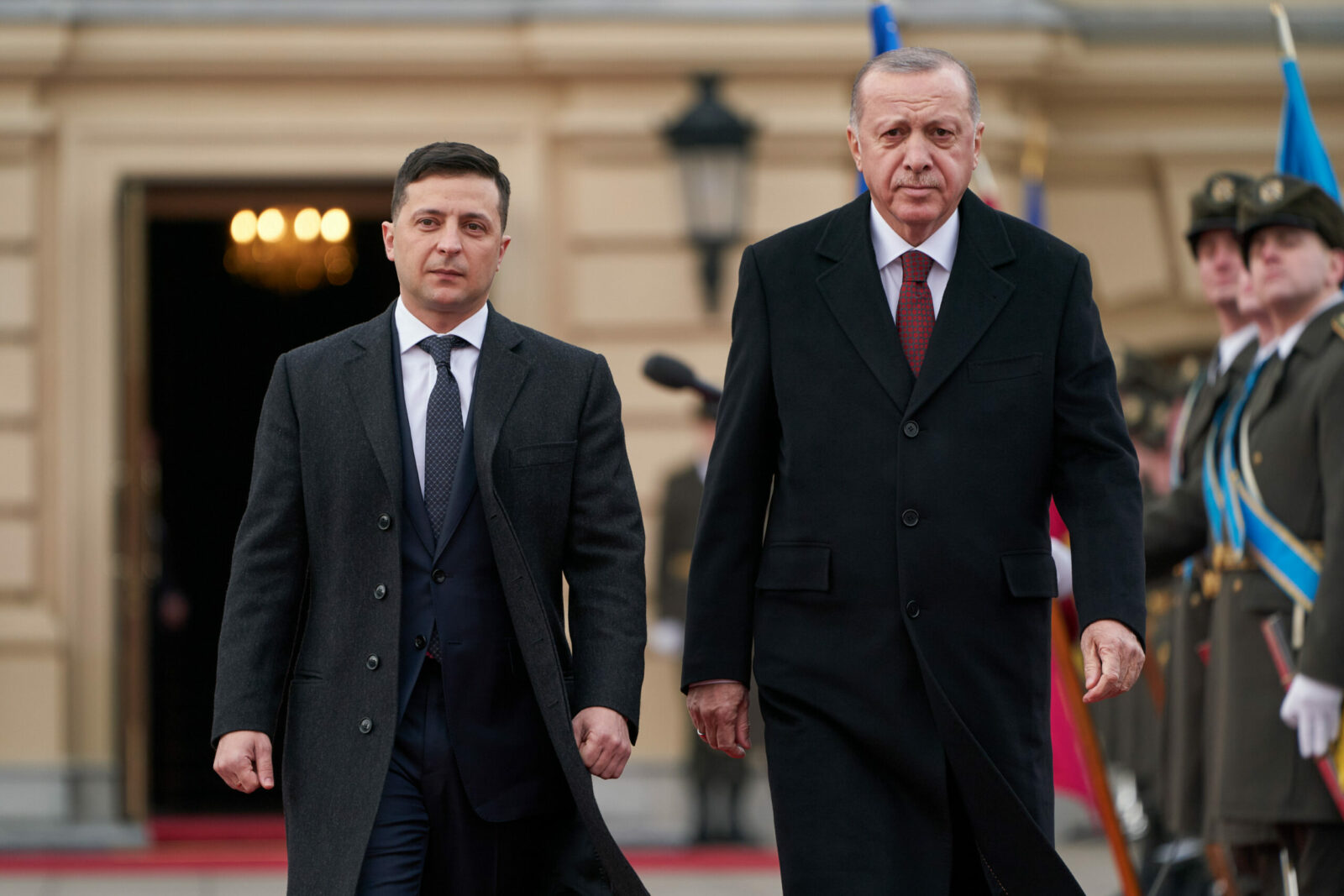Despite an explicit opposition to the military aggression against Ukraine both in discourse and in action, the Turkish government remains hesitant to break ties with Russia.
The conflict between Russia and Ukraine has turned into a de facto war by February 24 following the Russia’s invasion of Ukraine. An old member of NATO, Turkey, occupies an important position in this conflict because of its geopolitical importance, long military relations, and economic ties with both countries. Once the Russian attacks commenced, Turkey expressed an immediate support for “Ukraine’s political unity, sovereignty, and territorial integrity” and assessed the attacks as unacceptable.[1] Having not recognized Russia’s invasion and annexation of Crimea in 2014 either, Turkey continues to act aligned with other NATO members.[2]
As of February 27, the Turkish Foreign Minister declared that Turkey recognizes the Russian invasion as “war”, which is crucial for the implementation of the Montreux Convention of 1936 that regulates naval passage through the Turkish straits. The Montreux Convention gives Turkey the entire control over the passage of warships from Bosporus and Dardanelles Straits that connect the Marmara, the Aegean, and the Black Sea. In an active war situation, if Turkey is a part of the war or assesses itself threatened with a looming war, the convention gives Turkey the right to shut down the straits to the passage of warships. On the other hand, Article 19 of the Convention introduces an exception allowing the warship for returning to its port. This means, despite the ban, Russian (and Ukrainian) vessels can return to their base of origin.[3] Most of the Russian navy is currently at the Black Sea and those vessels do not need to use the Turkish Straits. Only a small number of Russian vessels are at the Mediterranean Sea and they will be allowed to return to the Black Sea given the above-mentioned exception. Therefore, the effectiveness of this legal sanction in terms of deterring Russia is questionable in the short term.[4] More recently, Turkey has also supported the resolution of the UN General Assembly condemning Russia’s invasion of Ukraine.
Despite an explicit opposition to the military aggression against Ukraine both in discourse and in action, the Turkish government remains hesitant to break ties with Russia given their close military and economic relations. This hesitation might also be linked to the foreign politics in Turkey prevailing over the last years with the intention to diversify the relations toward non-NATO states. President Erdogan has made it explicit in his speech at the Cabinet meeting stating that they would neither give up with Ukraine nor with Russia.[5] Unlike most of the Western countries, Turkey has so far not declared any economic sanction against Russia and not closed airspace to Russian airlines. Turkey has become increasingly reliant on Russian cooperation in key industries like energy, tourism, and agriculture, which is likely to continue limiting Turkey’s further reactions. The total trade volume between the two countries is currently over $20 billion.[6]
Dependence on Russia in terms of natural gas is a concern not only for Turkey but also for many other countries, especially in Europe. About one third of natural gas imports in Turkey come from Russia. Given the binding contractual agreements, it is not expected to experience a cut in natural gas flows from Russia but a rise in energy prices, which have already been on hike.[7] Russia builds the first nuclear power plant in Turkey, expected to be commissioned by 2023.[8] Turkey’s import dependency on Russia also prevails in the food sector. Russia ranks first when it comes to imports for wheat, barley, and sunflower oil. Last year, about 5 million Russian tourists came to Turkey, with an increase of 120 percent compared to the previous year.[9] Cutting off trade relations with Russia through the economic sanctions does not seem to be a preferred policy in sight for the Turkish economy, which has already been in a bottleneck, suffering from high inflation and depreciated currency. The general elections of 2023 put the government under even more pressure concerning the resulting economic consequences of further sanctions.
The government holds the opinion that closing the channels of dialogue with Russia will have a negative impact on the negotiation process initiated between Russian and Ukrainian officials. Allegedly, for this reason, they abstained from suspending Russia’s representation in the European council.[10] With Turkey’s mediation on March 10 a high-level negotiation meeting was held in Antalya. The meeting, attended by the foreign ministers of Russia-Ukraine-Turkey, is important in terms of being the first meeting to be held at the ministerial level since the invasion began. Although the desired ceasefire did not come out of the negotiation, Turkey has declared an explicit willingness to continue its mediation role between the two countries.[11]
[1] https://m.bianet.org/bianet/world/258254-turkey-to-continue-to-support-ukraine-s-territorial-integrity
[2] https://www.bbc.com/turkce/haberler-dunya-60604844
[3] https://edition.cnn.com/europe/live-news/ukraine-russia-news-02-27-22/h_a8b323ed583e6bd0e1706da806809f7a
[4] https://www.youtube.com/watch?v=4n0xZCHWw-U&ab_channel=Medyascope
[5] https://odatv4.com/siyaset/ne-ukrayna-ne-rusya-231111
[6] https://www.understandingwar.org/backgrounder/turkey-juggles-relationships-after-russia%E2%80%99s-invasion-ukraine
[7] https://www.birgun.net/haber/ukrayna-rusya-savasi-turkiye-yi-nasil-etkiler-377217
[8] https://www.bbc.com/turkce/haberler-dunya-60604844
[9] https://www.birgun.net/haber/ukrayna-rusya-savasi-turkiye-yi-nasil-etkiler-377217
[10] https://www.bbc.com/turkce/haberler-dunya-60604844
[11] https://www.dw.com/tr/antalyadaki-ukrayna-rusya-g%C3%B6r%C3%BC%C5%9Fmesinden-ne-%C3%A7%C4%B1kt%C4%B1/a-61080845
Featured image: President.gov.ua, Volodymyr Zelensky and Recep Tayyip Erdoğan, CC BY 4.0

